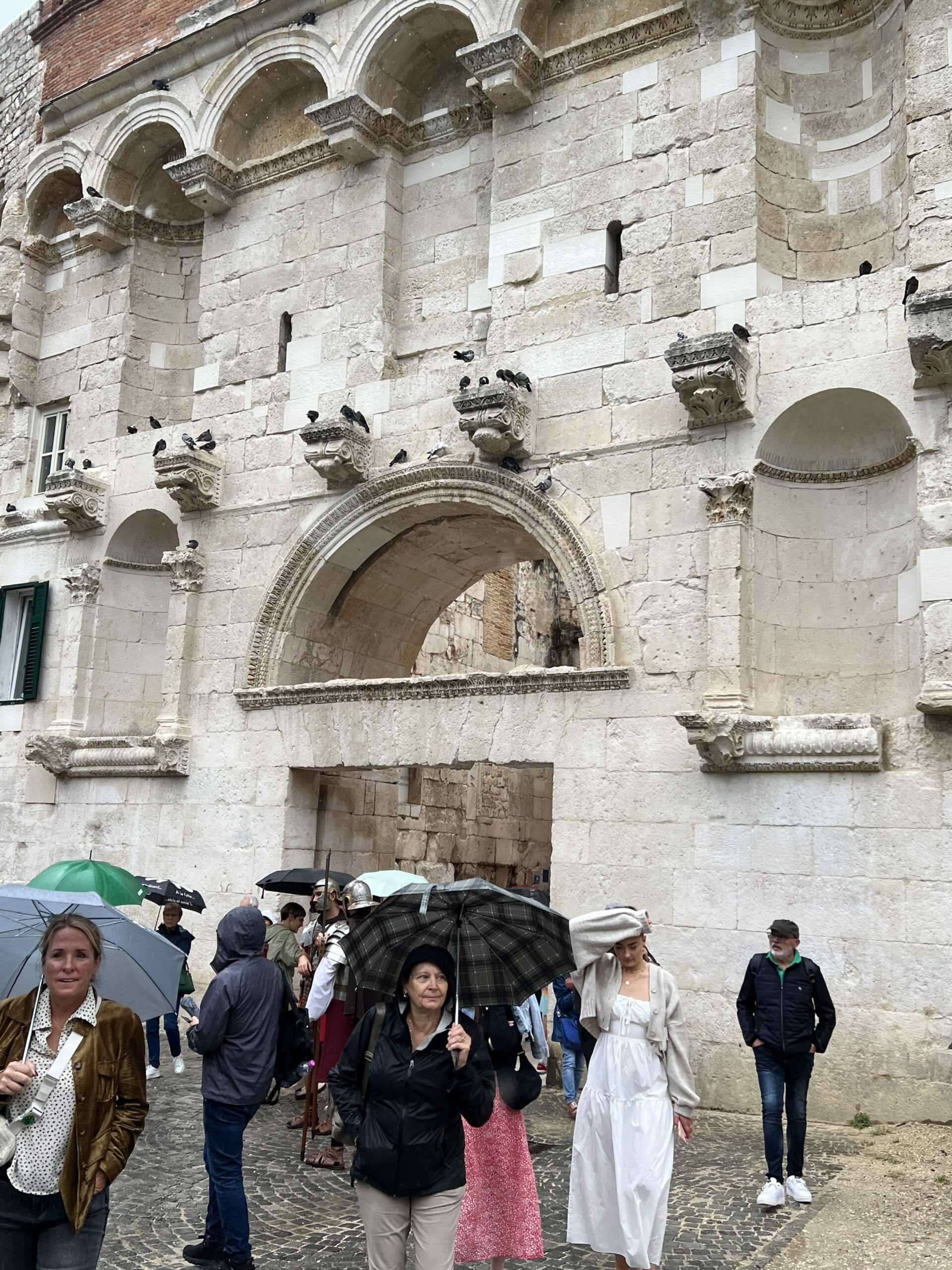It was spritzing in Split. No complaints, as it was our first day of rain since the start of the trip. Our guide led us through Diocletian’s palace, and to a small wine and olive oil bar for a tasting. Not as impressive as Dabović in Montenegro, but lovely nonetheless. And we heard traditional Croatian singing in the palace, which was quite moving.
Split is a fascinating place, with Diocletian’s Palace forming most of the city. It was built in the 3rd century and is now home to locals, shops, hotels and restaurants. It’s the oldest palace/fortress in the world still in use, and a UNESCO World Heritage Site.
The palace was not only a home for the Emperor and his family, but barracks for his military garrison. It’s 4 gates, Gold, Silver, Iron and Bronze, facing the 4 directions, are no longer standing but carved stone pillars and the remains of arches can still be seen. Some of the Game of Thrones was filmed here.
I wasn’t aware of Diocletian’s place in history and found his story to be quite fascinating. Diocletian was born to a family of low status in the Roman province of Dalmatia, rose through the ranks of the military early in his career, eventually becoming a cavalry commander for the army of Emperor Carus. After the death of Carus on a campaign in Persia, Diocletian was proclaimed emperor by the troops. He appointed fellow officer Maximian as Augustus, co-emperor, in 286. Diocletian reigned in the Eastern Empire, and Maximian reigned in the Western Empire. Diocletian delegated further in 293, appointing Galerius and Constantius as junior colleagues under himself and Maximian respectively. Under the Tetrarchy, or “rule of four”, each tetrarch would rule over a quarter-division of the empire. This was the only time a Tetrarchy existed in the Roman empire. Diocletian secured the empire’s borders and purged it of all threats to his power. He defeated the Sarmatians and Carpi during several campaigns between 285 and 299, the Alamanni in 288, and usurpers in Egypt between 297 and 298. Galerius, aided by Diocletian, campaigned successfully against Persia, the empire’s traditional enemy, and in 299, he sacked their capital. Diocletian led the subsequent negotiations and achieved a lasting and favorable peace.
Diocletian separated and enlarged the empire’s civil and military services and reorganized the empire’s provincial divisions, establishing the largest government in the history of the empire.
The Diocletianic Persecution (303–312), the empire’s last, largest, and bloodiest official persecution of Christianity, failed to eliminate Christianity in the empire. After 324, Christianity became the empire’s preferred religion under Constantine. Despite these failures and challenges, Diocletian’s reforms fundamentally changed the structure of the Roman imperial government and helped stabilize the empire economically and militarily, enabling the empire to remain essentially intact for another 150 years despite being near the brink of collapse in Diocletian’s youth. Weakened by illness, Diocletian left the imperial office in May 305, becoming the first Roman emperor to abdicate the position voluntarily. Most others were murdered, poisoned, or taken out by some other ghastly means. He lived out his retirement in his palace on the Dalmatian coast, tending to his vegetable gardens. Because of his persecution of Christians his burial tomb at the Mausoleum of the Roman Emperor Diocletian became a cathedral in the 7th century where altars with relics of St Domnius and St Anastasius, martyrs who were executed, take an honorary place.
The historian A.H.M. Jones observed that “It is perhaps Diocletian’s greatest achievement that he reigned twenty-one years and then abdicated voluntarily, and spent the remaining years of his life in peaceful retirement.”
Diocletian’s palace eventually became the core of the modern-day city of Split.



Leave A Comment